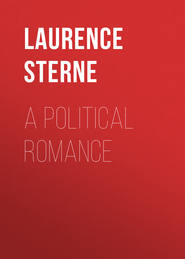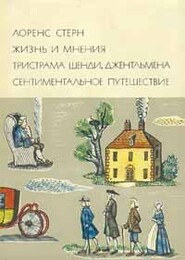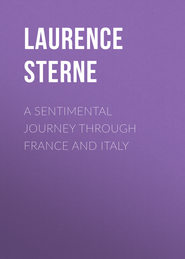По всем вопросам обращайтесь на: info@litportal.ru
(©) 2003-2025.
✖
The Life and Opinions of Tristram Shandy, Gentleman
Настройки чтения
Размер шрифта
Высота строк
Поля
Miles peregrini in faciem suspexit—Di boni, nova forma nasi!
At multum mihi profuit, inquit peregrinus, carpum amento extrahens, e quo pependit acinaces: Loculo manum inseruit; et magna cum urbanitate, pilei parte anteriore tacta manu sinistra, ut extendit dextram, militi florinum dedit et processit.
Dolet mihi, ait miles, tympanistam nanum et valgum alloquens, virum adeo urbanum vaginam perdidisse: itinerari haud poterit nuda acinaci; neque vaginam toto Argentorato, habilem inveniet.—Nullam unquam habui, respondit peregrinus respiciens—seque comiter inclinans—hoc more gesto, nudam acinacem elevans, mulo lento progrediente, ut nasum tueri possim.
Non immerito, benigne peregrine, respondit miles.
Nihili aestimo, ait ille tympanista, e pergamena factitius est.
Prout christianus sum, inquit miles, nasus ille, ni sexties major fit, meo esset conformis.
Crepitare audivi ait tympanista.
Mehercule! sanguinem emisit, respondit miles.
Miseret me, inquit tympanista, qui non ambo tetigimus!
Eodem temporis puncto, quo haec res argumentata fuit inter militem et tympanistam, disceptabatur ibidem tubicine et uxore sua qui tunc accesserunt, et peregrino praetereunte, restiterunt.
Quantus nasus! aeque longus est, ait tubicina, ac tuba.
Et ex eodem metallo, ait tubicen, velut sternutamento audias.
Tantum abest, respondit illa, quod fistulam dulcedine vincit.
Aeneus est, ait tubicen.
Nequaquam, respondit uxor.
Rursum affirmo, ait tubicen, quod aeneus est.
Rem penitus explorabo; prius, enim digito tangam, ait uxor, quam dormivero,
Mulus peregrini gradu lento progressus est, ut unumquodque verbum controversiae, non tantum inter militem et tympanistam, verum etiam inter tubicinem et uxorum ejus, audiret.
Nequaquam, ait ille, in muli collum fraena demittens, et manibus ambabus in pectus positis, (mulo lente progrediente) nequaquam, ait ille respiciens, non necesse est ut res isthaec dilucidata foret. Minime gentium! meus nasus nunquam tangetur, dum spiritus hos reget artus—Ad quid agendum? air uxor burgomagistri.
Peregrinus illi non respondit. Votum faciebat tunc temporis sancto Nicolao; quo facto, sinum dextrum inserens, e qua negligenter pependit acinaces, lento gradu processit per plateam Argentorati latam quae ad diversorium templo ex adversum ducit.
Peregrinus mulo descendens stabulo includi, et manticam inferri jussit: qua aperta et coccineis sericis femoralibus extractis cum argento laciniato (Greek), his sese induit, statimque, acinaci in manu, ad forum deambulavit.
Quod ubi peregrinus esset ingressus, uxorem tubicinis obviam euntem aspicit; illico cursum flectit, metuens ne nasus suus exploraretur, atque ad diversorium regressus est—exuit se vestibus; braccas coccineas sericas manticae imposuit mulumque educi jussit.
Francofurtum proficiscor, ait ille, et Argentoratum quatuor abhinc hebdomadis revertar.
Bene curasti hoc jumentam? (ait) muli faciem manu demulcens—me, manticamque meam, plus sexcentis mille passibus portavit.
Longa via est! respondet hospes, nisi plurimum esset negoti.—Enimvero, ait peregrinus, a Nasorum promontorio redii, et nasum speciosissimum, egregiosissimumque quem unquam quisquam sortitus est, acquisivi?
Dum peregrinus hanc miram rationem de seipso reddit, hospes et uxor ejus, oculis intentis, peregrini nasum contemplantur—Per sanctos sanctasque omnes, ait hospitis uxor, nasis duodecim maximis in toto Argentorato major est!—estne, ait illa mariti in aurem insusurrans, nonne est nasus praegrandis?
Dolus inest, anime mi, ait hospes—nasus est falsus.
Verus est, respondit uxor—
Ex abiete factus est, ait ille, terebinthinum olet—
Carbunculus inest, ait uxor.
Mortuus est nasus, respondit hospes.
Vivus est ait illa,—et si ipsa vivam tangam.
Votum feci sancto Nicolao, ait peregrinus, nasum meum intactum fore usque ad—Quodnam tempus? illico respondit illa.
Minimo tangetur, inquit ille (manibus in pectus compositis) usque ad illam horam—Quam horam? ait illa—Nullam, respondit peregrinus, donec pervenio ad—Quem locum,—obsecro? ait illa—Peregrinus nil respondens mulo conscenso discessit.
Slawkenbergius's Tale
It was one cool refreshing evening, at the close of a very sultry day, in the latter end of the month of August, when a stranger, mounted upon a dark mule, with a small cloak-bag behind him, containing a few shirts, a pair of shoes, and a crimson-sattin pair of breeches, entered the town of Strasburg.
He told the centinel, who questioned him as he entered the gates, that he had been at the Promontory of Noses—was going on to Frankfort—and should be back again at Strasburg that day month, in his way to the borders of Crim Tartary.
The centinel looked up into the stranger's face—he never saw such a Nose in his life!
–I have made a very good venture of it, quoth the stranger—so slipping his wrist out of the loop of a black ribbon, to which a short scymetar was hung, he put his hand into his pocket, and with great courtesy touching the fore part of his cap with his left hand, as he extended his right—he put a florin into the centinel's hand, and passed on.
It grieves, me, said the centinel, speaking to a little dwarfish bandy-legg'd drummer, that so courteous a soul should have lost his scabbard—he cannot travel without one to his scymetar, and will not be able to get a scabbard to fit it in all Strasburg.—I never had one, replied the stranger, looking back to the centinel, and putting his hand up to his cap as he spoke—I carry it, continued he, thus—holding up his naked scymetar, his mule moving on slowly all the time—on purpose to defend my nose.
It is well worth it, gentle stranger, replied the centinel.
–'Tis not worth a single stiver, said the bandy-legg'd drummer—'tis a nose of parchment.
As I am a true catholic—except that it is six times as big—'tis a nose, said the centinel, like my own.
–I heard it crackle, said the drummer.
By dunder, said the centinel, I saw it bleed.
What a pity, cried the bandy-legg'd drummer, we did not both touch it!
At the very time that this dispute was maintaining by the centinel and the drummer—was the same point debating betwixt a trumpeter and a trumpeter's wife, who were just then coming up, and had stopped to see the stranger pass by.
Benedicity!—What a nose! 'tis as long, said the trumpeter's wife, as a trumpet.
And of the same metal said the trumpeter, as you hear by its sneezing.
'Tis as soft as a flute, said she.











